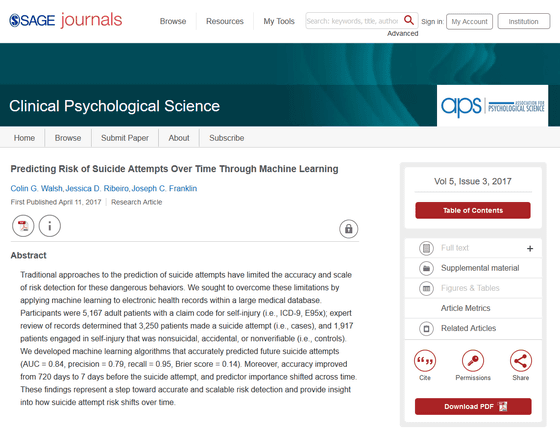Artificial intelligence predicts patients who may try suicide with accuracy of 90%

ByJay Reed
It is not easy to predict who will try to commit suicide among hospitalized patients. However, Associate Professor Colin · G · Walsh of Vanderbilt University has developed a machine learning algorithm for this problem, and succeeded in predicting suicide attempt with high accuracy by artificial intelligence.
Predicting Risk of Suicide Attempts Over Time Through Machine Learning Clinical Psychological Science - Colin G. Walsh, Jessica D. Ribeiro, Joseph C. Franklin, 2017
http://journals.sagepub.com/doi/abs/10.1177/2167702617691560

Artificial intelligence to predict suicide risk proved accurate in initial tests - Quartz
https://qz.com/1001968/artificial-intelligence-can-now-predict-suicide-with-remarkable-accuracy/
Associate Professors Walsh et al. Aimed to exceed this barrier by applying machine learning because the accuracy of the conventional "suicide prediction" was limited. At the Vanderbilt University Medical Center, 5167 electronic medical charts, which were said to have "self-hurt or suicide", and 12,695 randomly chosen among patients who did not commit suicide attempts People's electronic medical record.
As a result, artificial intelligence showed an accuracy of 80% to 90% in the forecast of "the possibility of trying to commit suicide in the next 2 years", and 92% with the prediction of "the possibility of attempting suicide next week".

ByNeelesh Bhandari
In the survey, Associate professors of Walsh et al., A hormone known for regulating biological rhythm ·MelatoninI realized that ingestion is an important point in calculating suicide risk. Associate professor Walsh said that "melatonin does not cause suicide", but states that melatonin is prescribed, that sleep disorder is thought to be related to suicide risk. However, this is still a hypothetical stage.
Related Posts:
in Science, Posted by darkhorse_log







